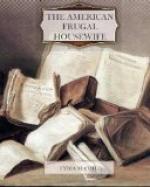If you happen to live in a house which has marble fire-places, never wash them with suds; this destroys the polish, in time. They should be dusted; the spots taken off with a nice oiled cloth, and then rubbed dry with a soft rag.
Feathers should be very thoroughly dried before they are used. For this reason they should not be packed away in bags, when they are first plucked. They should be laid lightly in a basket, or something of that kind, and stirred up often. The garret is the best place to dry them; because they will there be kept free from dirt and moisture; and will be in no danger of being blown away. It is well to put the parcels, which you may have from time to time, into the oven, after you have removed your bread, and let them stand a day.
If feather-beds smell badly, or become heavy, from want of proper preservation of the feathers, or from old age, empty them, and wash the feathers thoroughly in a tub of suds; spread them in your garret to dry, and they will be as light and as good as new.
New England rum, constantly used to wash the hair, keeps it very clean, and free from disease, and promotes its growth a great deal more than Macassar oil. Brandy is very strengthening to the roots of the hair; but it has a hot, drying tendency, which N.E. rum has not.
If you wish to preserve fine teeth, always clean them thoroughly after you have eaten your last meal at night.
Rags should never be thrown away because they are dirty. Mop-rags, lamp-rags, &c. should be washed, dried, and put in the rag-bag. There is no need of expending soap upon them: boil them out in dirty suds, after you have done washing.
Linen rags should be carefully saved; for they are extremely useful in sickness. If they have become dirty and worn by cleaning silver, &c., wash them, and scrape them into lint.
After old coats, pantaloons, &c. have been cut up for boys, and are no longer capable of being converted into garments, cut them into strips, and employ the leisure moments of children, or domestics, in sewing and braiding them for door-mats.
If you are troubled to get soft water for washing, fill a tub or barrel half full of ashes, and fill it up with water, so that you may have lye whenever you want it. A gallon of strong lye put into a great kettle of hard water will make it as soft as rain water. Some people use pearlash, or potash; but this costs something, and is very apt to injure the texture of the cloth.
If you have a strip of land, do not throw away suds. Both ashes and suds are good manure for bushes and young plants.
When a white Navarino bonnet becomes soiled, rip it in pieces, and wash it with a sponge and soft water. While it is yet damp, wash it two or three times with a clean sponge dipped into a strong saffron tea, nicely strained. Repeat this till the bonnet is as dark a straw color as you wish. Press it on the wrong side with a warm iron, and it will look like a new Leghorn.




